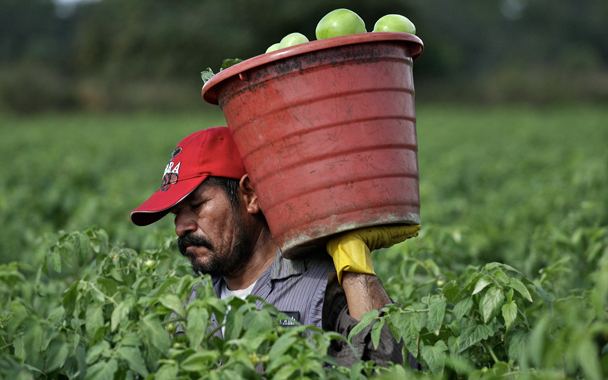In a few weeks, the migrant workers who plant and harvest tomatoes will begin trickling back into Immokalee, Florida, to prepare the fields for the winter/spring season, as they have done every fall for decades.
But this year, they will encounter something different. For the first time, a major Florida tomato producer, East Coast Growers and Packers, has implemented the Coalition of Immokalee Workers’(CIW) “Fair Food” program, breaking ranks with the dozen or so Florida companies that raise and ship most of the fresh tomatoes Americans eat during the cold months. The CIW’s initiative includes a one-penny-per-pound wage hike for workers (it might not sound like much, but it amounts to a 64 percent increase—the difference between poverty and a livable income) and a stringent code of fair labor practices.
There was an immediate payoff: Chipotle Mexican Grill, the enlightened burrito chain with nearly 900 restaurants across the country, agreed to buy its tomatoes from East Coast Growers (Chipotle had previously declined to support the Fair Food program).
For the past several years, the CIW has been pressuring restaurant chains and supermarkets to enter Fair Food agreements. McDonald's, Burger King, Subway, and Yum Brands had come aboard. But the Florida Tomato Growers Exchange, a cooperative representing most large growers in the state, refused to be a conduit for the extra penny a pound, citing legal concerns. (No one from the Florida Tomato Growers Exchange was available for comment on the Chipotle–East Coast deal.) So that money languished in escrow accounts. East Coast has agreed to pass the additional pay directly to its pickers.
“Chipotle has been a leader in driving change in the nation's food supply,” said Batiste Madonia, sales manager with East Coast, in a press release. “When their representatives came to us to negotiate this agreement, we agreed that it was the right thing to do. With this framework in place, we hope to work with other companies that are looking to make similar improvements to wages and working conditions for Florida farm workers.”
Which is exactly what the CIW hopes will happen. “They are the first big producer to come aboard,” said Julia Perkins of the CIW in a telephone interview. “Now that someone has stepped forward, there’s nothing holding the others back.”
The Chipotle–East Coast agreement is the latest in a string of good news for farm workers since Gourmet published an article on the grim plight of tomato pickers earlier this year.
In March, Florida governor Charlie Crist met with members of the CIW (becoming the first Florida governor to do so, despite decades of requests). In April, Bon Appetit Management Company, a huge food-service corporation that operates 400 university, museum, and corporate dining rooms in 29 states, joined with the CIW. Roughly a month later, Whole Foods announced that it had reached a Fair Food deal with two organic growers in Florida.
Despite the good news, the CIW still has plenty of work to do. Perkins hopes when other growers see that their competitors are reaping profits from doing right by pickers, they too will join the cause. “They’ve already missed the bus once,” said Perkins of the holdouts. “We hope that they don’t want to keep missing it.”


